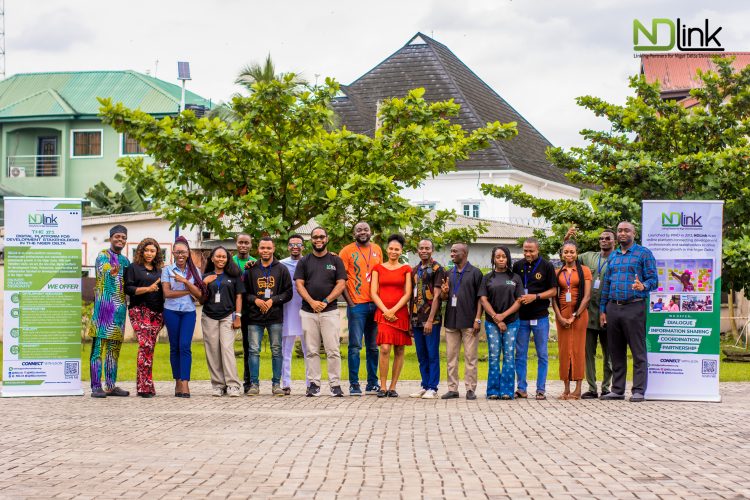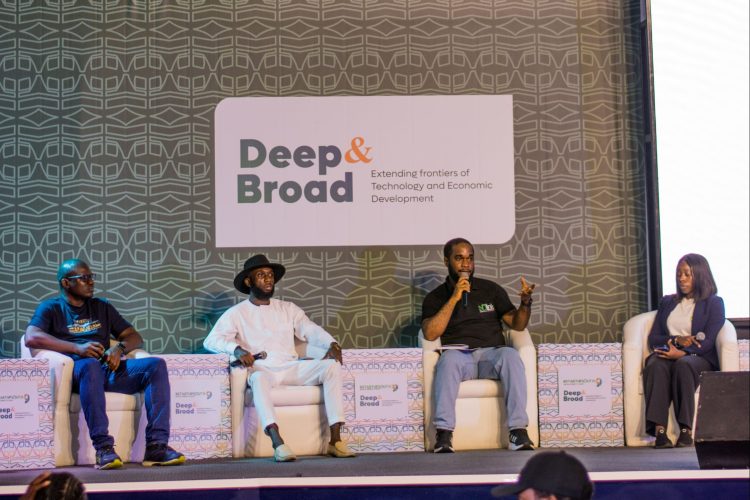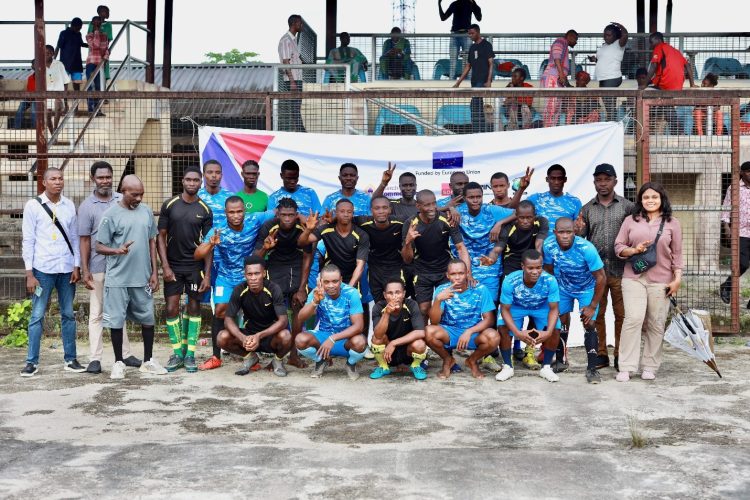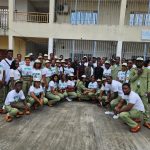
World Bank Approves $140m For Nigeria Community Development
April 9, 2014
NNPC, Addax Petroleum Float N37m Micro-Credit Scheme for 868 Women
April 10, 2014History of New Nigeria Foundation
New Nigeria Foundation (NNF) was registered with the Corporate Affairs Commission, Nigeria with Registration number RC 395631 in November 2000 as a non-profit organization designed to promote sustainable community development initiatives through public- private partnerships.
The vision of NNF is sustainable socio-economic development of communities through public-private partnerships. Its mission is to provide a platform for strategic private and public sector collaboration, aimed at promoting and funding sustainable socio-economic development activities in communities.
NNF is governed by a Board of Directors composed of reputable professionals under the Chairmanship of Dr. Pascal Dozie. The Foundation, under the leadership of Professor Obafemi Ajibola, Managing Director/CEO is staffed by 28 professionals with key skills in programme design and management, administration and business development.
NNF Strategies
At the heart of the Foundation’s programmes is the principle that sustainable development requires the participation of all stakeholders in programme design, implementation, monitoring and evaluation. The strategies adopted in implementing its projects include the following:
1)Â Â Â Â Â Partnering with local organizations in project implementation;
2)Â Â Â Â Â Engaging and partnering with local and state governments;
3)Â Â Â Â Â Implementing result-oriented, performance measuring systems to monitor and evaluate projects.
NNF Core Programmes
The Foundation has worked in several sectors including transportation, agriculture, health, education, employment generation, and so on. The programmes of New Nigeria Foundation (NNF) can be categorized into the following:
- Community Development Programmes: These include Education Programme (EP),Agricultural Competitiveness Programme (ACP), Community Health Services Programme (CHSP),Information and Communications Technology (ICT), Democratic Governance and Women Empowerment (DGWE), Youth Employment and Training Programme (YETP), and Management of Infrastructural Projects for private and public sectors
2. Development Research and Studies: These include transport surveys, socio-economic studies, value chain analysis, needs assessments, baseline surveys, monitoring and evaluation, perception surveys, and sustainable livelihood analysis
3. Social Investment Programmes: These include promotion of CSR activities in the private sector, facilitation of company-community relationships, social impact assessment, investment plan for state and local government.
4. Capacity and Institutional Building Programmes: These include training, mentoring, and technical support/advisory services.
NNF Funding
NNF has received funding from many international, national and private organizations such as United Nations Development Programme (UNDP), United Nations Foundation (UNF), UNHABITAT, World Bank, Canadian International Development Agency (CIDA), United States Agency for International Development (USAID), Department for International Development (DFID), German Technical Cooperation (GIZ), Akwa Ibom State Government, Bauchi State Government, Lagos State Government, Federal Ministry of Agriculture and Water Resources, National Investment Promotion Council, Bill and Melinda Gates Foundation, David and Lucille Packard Foundation, Chevron Nigeria Limited, Mobil Producing Nigeria Unlimited, Star Deep Water Petroleum Ltd, and Shell Petroleum Development Company, among others.
KEY PROJECTS
- A.     Researches and Studies
NNF has conducted a lot of desktop/field research and studies in the areas of value chain, transport, impact evaluation and the objectives of all these projects are achieved through enumerative surveys, key informant interviews, focus group discussions and case studies. Some of the project titles are as follows:
- Market Development for the Niger Delta Programme ( MADE, 2013 on-going)
- Analysis of Economic Opportunities in the Niger Delta ( PIND, 2011)
- Value chain analyses in the Niger Delta ( PIND, 2011)
- Examination and quantification of challenges faced by vulnerable groups in accessing public transportation, (LAMATA 2009)
- Socio-Economic Survey of Aboru Pipeline and Royalty/Ogombo and Other Roads Under the LUTP II Road Rehabilitation Programme, (LAMATA 2010)
- Socio¬-economic baseline survey of Mile 12 Ikorodu town BRT corridor, (LAMATA 2012)
- Socio-Demographic Baseline Survey of Akin Adesola and WEMPCO Roads, (LAMATA 2013)
- Evaluation of Advisory Services Activities under the Fadama II project in Abuja FCT, Imo, Lagos, Niger, Ogun and Oyo states in Nigeria, etc.  (The National Fadama Development Office of National Food Reserve Agency (NFRA – NFDO 2008)
- Sourcing and Organizing Local Niger Delta Specific Content For NDLink Website (PIND, 2013)
Lessons Learnt and impact on local communities
These studies clearly demonstrate the importance of engaging community members prior to policy implementation. Through these studies valuable data bases and baseline information were provided to aid design and implementation of community development projects.
B.     Social Investment Programmes – Facilitation of Company – Community relationships
1. Global Memorandum of Understanding ( GMoU) Evaluation
NNF, with other partner NGOs, has been involved in GMoU evaluation among which are the phases 1 and 2 of Chevron GMoU across the eight Regional Development Councils in Chevron communities /areas of operations ( Chevron  Nigeria Ltd, 2008, 2011) and also the Mid- term review of Shell Petroleum Development Company (SPDC) GMoU in SPDC communities. These evaluations involved planning and design of the evaluations and data collection using key informant interviews and focus group discussions.
2. Facilitation of GMoUs and MoU
NNF has been involved in the training of staff of Chevron Nigeria and leaders of its host communities on Mutual Gains Approach to negotiation which is a participatory approach that promotes learning among participants.  NNF has facilitated the negotiations and re-negotiations between Chevron Nigeria Ltd and the 8 Regional Development Councils (RDCs) in Chevron’s areas of operation (Chevron Nigeria Ltd, 2005-2006, 2008 – 2009 and 2011 – 2012); NNF has also been contracted to facilitate the MoU between WAPCO and the Community Development Councils (CDC) within the communities where WAPCO operates (Lafarge Cement WAPCO 2011 on-going).
 Lessons Learnt and impact on local communities
Importance and effectiveness obtained in adopting mutual gains approach that emphasizes ‘Win–Win’ outcomes in negotiation which led to improved economic performance of the companies and improved socio-economic conditions of the communitie
c. Â Â Community Development Programmes
1.      Initiative Triple E Project: Preparing Students of Secondary Schools Chevron Western Operations Areas to excel in SSC Examinations: The project seeks to improve the performance of students in the Secondary School Certificate Examinations in Chevron Western operation areas over a two-year period. The two-year project involves preparing students of 19 schools in Delta and Ondo states for the secondary school national examinations. Project components include training of teachers and school administrators, improved access of students to relevant educational opportunities.
2.      Mobil Special Projects: Management of 38 infrastructural projects (markets, health centers, bore holes, town halls and classrooms) in some communities in Esit Eket LGA of Akwa Ibom state. Facilitated the engagement of qualified and competent professionals/contractor(s) required for the execution of the projects and ensured safe practices on work locations.
3.      Star Deep Water Infrastructural Project: Construction and renovation of infrastructural projects
4.      Community Health Services Programme (CHSP) in 46 communities in 12 States: The primary objective of the CHSP was to improve the health status of populations in target communities with special focus on mothers and their under-five children. CHSP approach was based on the principles of co-management and co-financing of community primary health care systems as well as demand-driven identification and prioritization of corresponding community-based interventions. It incorporated a process of needs assessment, strategic planning and project design that fully involved concerned community-based organizations in developing a medium-term (3 – 5 years) health plan.
Lessons Learnt and impact on communities
Improved access to learning aids in schools, improved social amenities to benefitting communities, improved capabilities of local contractors, training opportunities created and boosting of local economies of communities. Improved agricultural products and better linkages among operators of agricultural value chains.
D.  Capacity and Institutional Building Programmes:
1.      Participatory Partnerships for Community Development (PPCD): NNF is managing the PPCD project set up by Chevron Nigeria Limited (CNL) as a vehicle to strengthen and build the capacity of the Regional Development Councils (RDCs) to deliver on the Global Memorandum of Understanding (GMoU) which it entered into with the Communities and State Governments in the areas where it does business in the Niger Delta. PPCD commenced its operations in early 2010 with assessment of the RDCs to identify the total gamut of capacity gaps through organizational capacity assessment (OCA). After the assessments, bespoke capacity building programmes were designed and delivered to all the RDCs from 2010 to date.
2.      Local Economic Development Programme: Capacity building workshops for Business Development Committees set up by the German Technical Cooperation (GTZ) in Niger and Nasarawa states between 2007 and 2008. NNF used the ‘Compass’ tool to assist local stakeholders in strategizing, monitoring and continuously assessing and adjusting their processes for Local Economic Development (LED).
 Lessons Learnt and impact on communities
Importance of community ownership of projects, multi-stakeholder partnerships, capacity building for community members in execution of development projects. Enhanced capacities of members of indigenous communities to participate in development and increased productivity and incomes for local business.
NNF can be reached by visiting their website at www.nnfng.org, via phone at 234-1-4619688-9 or 234-1-4619688-9, via email at new_nigeria@yahoo.com or contact@nnfng.org, or by visiting their offices in either Lagos, Warri, or Port Harcourt.









